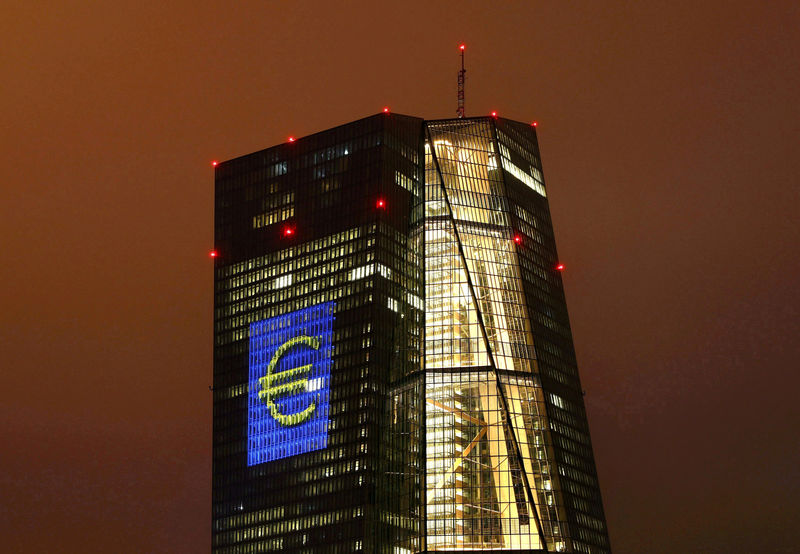By Dhara Ranasinghe
LONDON (Reuters) - High-grade euro zone debt remains scarce even though the European Central Bank has stopped its huge purchases of new bonds, intensifying concerns that banks will face future collateral shortages and highlighting the need for safe assets.
The persistent shortage of triple-A rated assets partly reflects a political dispute within the 19-country euro zone over whether to issue bonds backed by the bloc as a whole.
That would boost the amount of risk-free securities in circulation but is disliked by Germany and other countries, who see it as a back door to mutualizing debt obligations among member states with vastly different debt burdens.
Numerous factors, from a scaling-back of rate-rise expectations to growth and political risks, are accelerating demand for safe assets. But triple-A-rated governments like Germany and Netherlands are running budget surpluses and so have less need to borrow than in the past.
That imbalance has pushed Germany's 10-year yield to just 0.2 percent, even after the ECB stepped out of the market two months ago.
Investors' scramble for top-rated assets can have damaging consequences. For one, unnaturally low yields distort the bond market's capacity to act as a signaling tool on the economy. Another worry is the possibility of a squeeze on repo markets, where this debt is used as collateral by banks and businesses trying to raise cash.
Repos, or repurchase agreements, are viewed as the plumbing of the financial system. What many fear is a repeat of the funding market squeeze seen in early 2017, when looming French elections sparked a dash for German debt, exacerbating a shortage of short-dated bonds.
A repo market squeeze due to collateral shortages remains a concern, said Godfried de Vidts, senior advisor to the Repo and Collateral Council at the International Capital Market Association (ICMA), a lobby group. Pressure on the market has currently eased, he said.
With ECB bond-buying, or QE, at an end, German five-year debt yields should be about 44 basis points above current levels of minus 0.31 percent, according to Richard McGuire, Rabobank's head of fixed income.
This "QE premium" has barely budged since December, just as ECB buying ended, McGuire said.
"That means the loss of (ECB) demand ... has been perfectly offset by investors looking for safety," he added.
"So when investors said that yields should rise because the ECB won't be buying anymore, they are clapping with one hand because in actual fact other investors have just moved into where the ECB was."
SWAP GAP
Highlighting how scarce top-rated euro assets are, ECB policymaker Ewald Nowotny recently noted that in the United States, the pool of "strong safe assets" amounted to 74 percent of gross domestic product but was just 11 percent of GDP in Germany.
Even after taking into account other EU countries, the figure is 30 percent, Nowotny said.
Analysts cite the wide gap between German or Dutch bond yields and corresponding swap rates -- an exchange of a fixed interest rate versus a series of floating rates -- as a supply tightness indicator.
This spread widened after the ECB started QE in 2015 and cash bond yields fell. When asset purchases ended in December, the spread should have narrowed, but in fact, the gap between 10-year German yields and the swap rate is near the widest since the euro zone crisis, at around 60 basis points.
The German and Dutch debt agencies declined to comment on the gap between swap rates and bond yields. The German agency said dealer banks and investors such as asset managers and pension funds had not reported difficulties trading German bonds.
But trading volumes are under pressure, even though Germany's 2 trillion euro bond market is one of the world's biggest. Trading volume in German bonds nudged up in 2017 to almost 4.8 trillion euros but is down 27 percent from 2007.
That partly reflects the growing presence of long-term investors like pension and sovereign wealth funds. Around half of all German federal debt is held by the Bundesbank and other central banks, debt agency data shows.
For interactive chart: https://tmsnrt.rs/2U8APwb
Graphic: German Bund yield vs swap rate (https://tmsnrt.rs/2Vm9975)
NEEDED: A SAFE BOND
ICMA's de Vidts says one solution is to have a capital markets union and, by extension, one central issuer of government bonds for the euro zone instead of 19 different bond markets of varying credit quality.
That idea faces strong opposition from Germany, but the ECB's Nowotny has added his voice to those calling for joint bonds and ECB officials have delved into the issue in the past.
"It (capital markets union) is not going to happen tomorrow, nor in the next five years, but it could really help -- it would be akin to having a U.S. Treasury market," de Vidts said.
Meanwhile, as bond scarcity keeps yields on two-year German bonds -- Schatz -- deeply negative, their role as a key gauge of interest rate expectations has faded.
"Look at the Schatz yield, that's not the market saying the ECB will cut rates but the curve has distorted the information content," said Ross Hutchison, rates portfolio manager at Aberdeen Standard Investments.
Graphic: Trading volume in Germany's government bond market (https://tmsnrt.rs/2UaDBRk)
Graphic: Germany's 2-year Schatz yield (https://tmsnrt.rs/2UeIM32)
